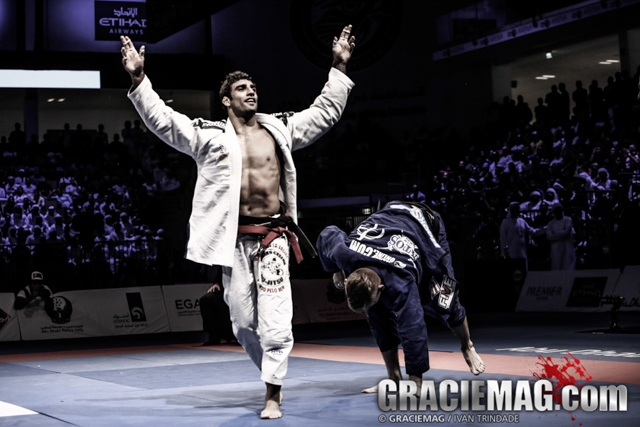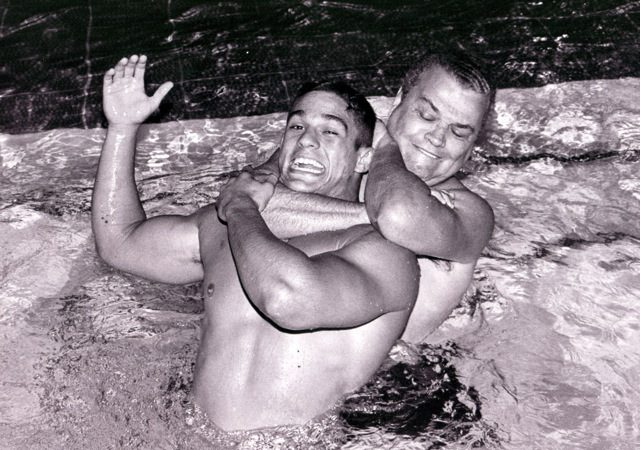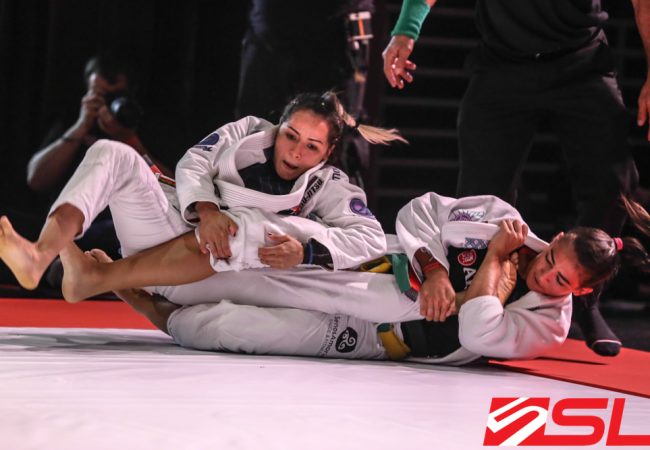
Leandro Lo
“I’ll only think about quitting fighting in the IBJJF Worlds when I win the absolute; it’s the title I want most today,” Leandro Lo repeats like a mantra.
Indeed the Cícero Costha-graduated black-belt has a fixed mission on his mind. While he doesn’t accomplish it, he goes on sweeping and passing the guards of everyone who crosses his path. Happy for making a living off BJJ, the São Paulo-born five-time world champion achieved a startling sequence as he won his weight class from 2012 to 2016, without missing a single gold. And he did it with authority, changing categories with no fear of becoming a legend: he won at lightweight (2012/13), middleweight (2014) and medium-heavyweight (2015/2016). Not to mention his bronze medals in the open division.
To try and surprise Lo the way he does his opponents of all sizes, the Graciemag team invited, for a recent magazine piece, a squad of BJJ standouts to shoot various questions at the open guard expert, who now leads his own gym, Brotherhood Jiu-Jitsu. Check it out and step into the mind of the champion.
MARCUS BUCHECHA (Checkmat): “What is your motivation to keep fighting given that it’s been a while since you last lost in your division? Where do you get the motivation to compete all the time?”
LEANDRO LO: First I’d like to say I was very happy to see all these BJJ greats sending me their questions, so thank you. Well, bro, I think my motivation must be similar to Buchecha’s, who has always fought even more than I, and who fought and won everything in BJJ. The biggest reason is that I really love fighting BJJ; I really like rolling at the gym — it’s what I like doing most: going to the gym, putting on the gi and training with anyone, even of a lower rank. What I like is to test myself. To me, championships are like training — it’s where I can see how that technique will work against one guy or another. Since I used to to weigh 76kg, I’ve always had this opportunity to train and fight everybody, from the light guys to the heavier ones in the open, and I dig that a lot. In BJJ each day is a day: if yesterday I beat an opponent, tomorrow he might find a way to surprise me. He will also evolve in time and try to create some difficulties. Thus I’m always looking forward to competing, be it against the new guys or my old rivals, to see whether my game still works against them. My desire to compete also comes from the desire to test myself against the new generation of BJJ. I like finding out whether I’m still well prepared to beat the new guys, finding out how I’ll deal with these new guys’ game and stamina in competitions. Because of that, I think I’ll only quit fighting when I’m pretty old, when I can no longer do it, or when I start getting my ass handed to me too often. In the meantime, I’m addicted to fighting. I only talk about BJJ; my friends even tease me: “Can we talk about something else?” But I only talk about BJJ practically all day. [Laughs.]
BERNARDO FARIA (Alliance N.Y.): “Did you change something about your physical preparation? What is your current training routine? And how many fights do you do per session?”
LEANDRO LO: I used not to put a lot of faith into physical preparation; I thought it was enough to just roll and focus on training BJJ to fare well in championships. But I began realizing that that’s not quite right. Many times in the middle of championships, especially in the open division, my strength would leave me, and I’d be left with only my technique. But, against very strong, technical guys I wasn’t able to do anything more. I saw it was necessary to work on power and physical preparedness. My opponents are technical and strong; I can’t afford to be just technical — it ends up being a lopsided fight. Nowadays I do physical preparation and weightlifting with a personal trainer, three times a week. About rolling at the gym, I usually do eight to ten fights a day in the gi. It’s about an hour and a half of sparring. I also do specific training of guard and guard-passing Tuesdays and Thursdays, to sharpen the position and shave off the errors. Mondays, Wednesdays and Fridays, it’s sparring only. It’s been about three years since I last did any drills.
MICHAEL LANGHI (Alliance): “How do you divide your training time and periodizing for competitions? Are there drill-only session and sparring-only ones? How do you work on your mindset during championships, since you go into your fights very confident? Is there some sort of mental strategy?”
LEANDRO LO: I fully believe in my BJJ — hence the confidence. If I look at my opponent and feel I can win, that my game will confuse him, then I go in even more confident. There are times when I look at the guy and think I can’t win — the big guys especially, — but then I go in to test myself and see what happens. I don’t usually think about positions or about what I’m going to try to do in the fight area, because that can trip me up. I prefer to let it flow when it’s time. For instance, if I think about pulling into guard and draw a whole strategy around that, if he pulls first I can get frustrated and may need to rethink the whole thing. I think I began improving much more in my performances when I started letting things happen and see what goes on when it’s time. I think the psychological part of BJJ depends heavily on training — if the positions were well done and worked, you go in confident and let it flow when it’s time. And it ends up working out.
CLAUDIO CALASANS (Calasans Camargo Academy): “As an athlete and teacher, what do you find more important — having well-rounded BJJ or specializing first on being a guard player or a passer?”
LEANDRO LO: I think nowadays the guy has to become a specialist, but in both aspects — to try and get really good as a guard player, but also as a passer. There’s nowhere to run to anymore; I tell that to my students. In competitive BJJ that’s even more true; that’s ideal for fighting and surprising any opponent, whatever their favorite game. Everybody these days can pull well and attack well on top. It’s perhaps even more important not to let a good position slip. Becoming a specialist on finishing on the back if you get there, not losing the mount and so on, having a tough guard to play against, and having a base in order not to get easily swept, a good takedown When you are no longer vulnerable and feel safe, and when only a few people can pinpoint your flaw, you’re on the right track. I think being a strong BJJ fighter is being a good guard player and passer; otherwise, you are a bit of an incomplete fighter. That’s why in the beginning I think the student has to train, roll, compete all the time, and only then start thinking about strategy and physical preparation. The opponent has to look at you and get uncomfortable, afraid of your guard, your pass, your takedown. I’ve always sought that for myself, and I prescribe that to my students.
TARSIS HUMPHREYS (Alliance): “Do you feel different when you fight after dieting and eating healthy, or do you prefer to fight while eating everything, following that unorthodox diet of yours?”
LEANDRO LO: I used to eat all sorts of stuff; I even used to drink soda not long ago. But I went to a nutritionist in December, before fighting in the Copa Pódio Lightweight GP, and I confess I felt much better [laughs]. I would wake up feeling better to go train in the morning; I felt my body was lighter for training. I asked her for a special weight-gain diet now. I quit coke, except for some weekends. I’m officially dieting; now I follow an athlete’s regimen.
GILBERT DURINHO (Zenith JJ): “What were the five toughest rivals you’ve ever fought, the ones that made you the most uncomfortable? Do you think of doing MMA?
LEANDRO LO: Man, I think everybody’s tough! Maybe I can list five. Durinho was one of them, a guy that gave me a hard time when I arrived at the black belt, but who’s currently doing MMA. Nowadays I’d say Rodolfo Vieira, who passes guard really well, is strong and full of stamina. Marcus Buchecha, against whom it’ takes a massive effort to just squeeze out an advantage; I think he’s a very intelligent guy, who knows exactly what he’s doing in a match, who attacks at the right time, besides defending very well. Lucas Lepri would be on this list, because he has a lot of resources in whatever position he lands in; he can get out of every attack — his BJJ is truly excellent. And Felipe Preguiça, who has a lot of BJJ and a lot of heart; he never gives up. Finally, since I cannot list another five or ten, I’d say Keena Cornelius — very technical and dangerous with his unpredictable lapel guard; he keeps coming up with new stuff. About MMA I don’t think. I can make a good living off of BJJ, with my gym and sponsors, so I don’t think of starting over in MMA for now. I don’t even know whether my sponsors would stay with me in a different sport. I never say never, but for now it’s not a goal I have.
GUTO CAMPOS (Guetho JJ): “When you got into BJJ, what was your intention? Did you just want to learn a martial art, or were you thinking of building a career?”
LEANDRO LO: I wasn’t very good in school, so I always wanted to fight and play sports. At 18, when I was a purple-belt, I got addicted to BJJ and dreamed of making a living in it, but there was a period where things got togh and I tried to get a job in a company. But I soon realized that was not going to make me happy, and I went right back to training hard.
GRACIEMAG: Why did you feel it was time to found your own team, Brotherhood?
LEANDRO LO: At some point you have to make your own way, right? I thought for me that time came this year. I felt very much in tune training with my friends, with those guys. I started training with those guys on mornings, and we created a very strong bond. We decided to make our own school, just with the friends that trained together and always helped each other. It was a natural sequence in the life of an athlete.
https://www.youtube.com/watch?v=K0HIXF6msbA




